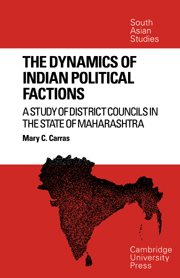Book contents
- Frontmatter
- Contents
- List of tables
- List of maps
- Acknowledgments
- 1 Introduction
- 2 The Argument
- 3 Political Integration: Empirical Conception and Method of Analysis
- 4 Ratnagiri District: Factional Alignments in Conditions of Poverty
- 5 Poona District: The Politics of Sugar
- 6 Aurangabad District: State versus District Leaders
- 7 Akola District: Factional Alignments in Conditions of Relative Plenty (The Politics of Cotton)
- 8 All Districts: Some Comparisons
- 9 Conclusion
- APPENDICES
- Notes
- Bibliography
- Index
5 - Poona District: The Politics of Sugar
Published online by Cambridge University Press: 23 November 2009
- Frontmatter
- Contents
- List of tables
- List of maps
- Acknowledgments
- 1 Introduction
- 2 The Argument
- 3 Political Integration: Empirical Conception and Method of Analysis
- 4 Ratnagiri District: Factional Alignments in Conditions of Poverty
- 5 Poona District: The Politics of Sugar
- 6 Aurangabad District: State versus District Leaders
- 7 Akola District: Factional Alignments in Conditions of Relative Plenty (The Politics of Cotton)
- 8 All Districts: Some Comparisons
- 9 Conclusion
- APPENDICES
- Notes
- Bibliography
- Index
Summary
As we move northeast from the coastal plain in the Konkan to the Deccan plateau we come upon Poona District, whose population of two and a half million (approximately) exceeds that of Ratnagiri by about 700,000. Nevertheless, in terms of the number of citizens who come under the jurisdiction of the Zilla Parishad, the Poona Council is slightly smaller. The reason for this is that Poona is more highly urbanized than Ratnagiri. In fact, the densely populated City of Poona accounts for much of the urban population of the district. Because municipalities have their own local governing bodies, the population in such urban areas does not fall within the purview of the Zilla Parishad, which is a rural body. Hence, the constituency of the Poona Council is smaller.
THE IMPORTANCE OF SUGARCANE IN THE RURAL ECONOMY
This district is of particular significance in the context of this study because of the important position that a cash crop, namely sugarcane, occupies in the rural economy. Poona produces more low-energy and lower-valued crops (like millets) than the State as a whole, while production of more highly-valued (and higher-energy) staples, like rice and wheat, is lower than the State average. However, as one official publication points out, the ‘relieving factors are the higher proportions of area under the commercial crop “sugarcane”’ and larger irrigated areas, which raise the gross value of output per acre of cultivated area very near to the State average.
- Type
- Chapter
- Information
- The Dynamics of Indian Political FactionsA Study of District Councils in the State of Maharashtra, pp. 80 - 103Publisher: Cambridge University PressPrint publication year: 1972



